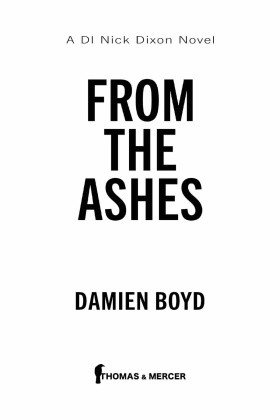Woakes took the photograph in his left hand, lifting his reading glasses which were on a cord around his neck and using them like a magnifying glass in his right. ‘Never seen either of them before,’ he said. ‘When were they members?’
‘We don’t know that they were,’ replied Dixon. ‘At this stage, we’re just trying to find anyone who knew them.’
‘There are several bridge clubs in Burnham. We play every Tuesday evening here, and there’s another at the tennis club every Tuesday and Wednesday afternoon. They might have played there. It’s quite an elderly demographic these days, I’m afraid. It’s a chance to get out of the house and see a friendly face for most of us. The younger lot seem to play online. How long ago were they playing?’
‘We don’t know that either, I’m afraid, Sir.’ Dixon sighed. ‘That photo can’t be more than twenty years old.’
‘Ah, well, I’ve only been here ten years or so.’
‘Do you have membership records?’
‘Somewhere.’ Woakes grimaced. ‘I computerised it all about eight years ago, so I’d need to find the old book. It was just a ledger, really, with scribblings in it. And I say computerised; it’s just a spreadsheet.’
‘They were local teachers,’ continued Dixon. ‘Deirdre Baxter at St Christopher’s and Michael Allam at St Joseph’s.’
‘Doesn’t ring a bell.’
Dixon looked over Woakes’s shoulder at the various tables in the large room. He’d counted nine, so that made thirty-five other people who might know them.
Woakes got the message. ‘We can break for coffee after this hand, if you’d like to ask everyone. We’ve got a good turnout tonight.’ He smiled. ‘Must be football on the telly or something. I’d better just go and finish my . . .’ His voice tailed off.
Dixon had never understood bridge, exhausting his limited knowledge in the opening bids he had been playing with George Sampson earlier that afternoon. ‘One no trumps’ – whatever the hell that was supposed to mean. He could make sense of no bid, or one heart even. It was like another language; he understood the odd word here and there.
‘Do you play bridge, Sir?’ asked Louise.
‘I walk my dog.’
‘Yeah, it’s a bit beyond me too.’
People began getting up from their tables and heading towards the tea and coffee laid out on a table at the back of the room.
Woakes clapped his hands. ‘Everybody, we have a couple of police officers here this evening. They’d like you to look at a photograph and see if you recognise the bridge players pictured.’
Tea and coffee seemed to be a higher priority.
‘I’ll go and stand behind the table with the photo,’ said Louise.
‘Keeps the mind agile.’ Woakes appeared at Dixon’s elbow with a cup of tea in one hand and a biscuit in the other. ‘You should try it.’
‘I have more than enough to keep my mind agile, Mr Woakes.’
‘Of course you do. Sorry.’ He took a sip of tea to hide his embarrassment. ‘Is it about that woman who was murdered in Berrow?’
‘It is.’
‘And that’s her in the photograph?’
‘With, we think, her bridge partner.’
Louise was leading an elderly lady to an empty table on the far side of the room, holding her elbow and carrying a cup and saucer for her. ‘Sir, this is Agnes Harrington,’ she said, when Dixon approached. ‘Agnes knew Deirdre and Michael.’
The old lady looked up at Dixon, her eyes trying to focus on his face. ‘I saw you earlier on the television, didn’t I?’
‘When I was asking anyone who knew Deirdre Baxter or Michael Allam to get in touch with us as a matter of urgency, perhaps?’
‘I didn’t think it would be relevant.’ Agnes shrugged her apology. ‘After all, I haven’t seen either of them for, what, twenty years or more.’
Dixon sat down opposite Agnes, conscious that Louise was glaring at him. ‘Start at the beginning.’
‘I knew Deirdre through golf. We played in the ladies’ section at Burnham and Berrow for several years, and then we started playing bridge. There was a group of ladies who’d play in the afternoons, after we’d done eighteen holes. I was hopeless at it, really, but Deirdre took to it. She taught maths and it suited her, at least that’s what she said.’
‘When was this?’
‘The early nineties, maybe. I haven’t played golf since the millennium – my ankles, you know – so it must’ve been before that.’
Agnes may have been in her late eighties, but her mind was still sharp enough. Maybe there was something to this bridge game? Her eyes burned brightly, even behind the bottle-top glasses.
‘I tried bowls,’ continued Agnes, ‘but I couldn’t get on with it, so started coming here to play bridge competitively. Deirdre did the same, but got very good, very quickly. She started playing with Michael Allam, I remember.’ She picked up the framed photograph. ‘That’s a photograph of them holding the Somerset County Bridge Union Pairs Cup. 2003 I think that was. They went to the West of England Congress at the Winter Gardens in Weston-super-Mare. All over the place, they went.’
‘Did you know Michael Allam?’
‘I met him here when I joined and we played together once or twice, but I was nothing like good enough for him. I was driving the poor fellow mad. That’s when he started playing with Deirdre. She was younger than me, and I think they hit it off in other ways too, if you know what I mean?’
‘Spell it out for me, Agnes,’ said Dixon.
The old woman turned to Louise. ‘Must I?’
‘I’m afraid you must,’ replied Louise.

























